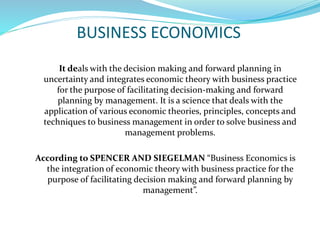The Future of global evolution of Business and Economics is likely to impact global economies
The Future of global evolution of Business and Economics is likely to impact global economies
Blog Article
Understanding Financial Principles for Better Organization Decision-Making
In the facility landscape of modern-day service, a detailed understanding of financial principles can substantially boost decision-making processes. By checking out variables such as market structures and customer behavior, organizations can tailor their techniques to align with affordable dynamics and consumer requirements. Moreover, understandings right into need elasticity and chance costs give a framework for maximizing source allotment. The application of these economic theories typically reveals unexpected difficulties and possibilities that can redefine calculated techniques. What ramifications do these insights hold for the future of company approach?
The Basics of Economic Theory
Economic concept functions as the structure for recognizing how organizations and individuals choose in the presence of shortage. At its core, financial concept analyzes the appropriation of minimal resources to please unrestricted desires. This basic concept of shortage necessitates compromises, engaging decision-makers to examine the expenses and advantages associated with various choices.
Both primary branches of financial theory are microeconomics and macroeconomics. Microeconomics concentrates on private agents, such as customers and companies, examining their actions and interactions in details markets. It highlights ideas like supply and demand, rate flexibility, and market balance, which are critical for understanding exactly how prices are figured out and how resources are distributed.
On the other hand, macroeconomics examines the economic climate overall, dealing with wider concerns such as rising cost of living, unemployment, and economic development. It supplies insights into systemic phenomena that affect all financial representatives, leading policymakers in crafting efficient financial techniques.
Ultimately, a strong grounding in financial theory is vital for reliable company decision-making. By comprehending the principles of deficiency, compromises, and market dynamics, companies can better make and navigate complicated atmospheres educated choices that improve their competitive benefit.
Key Economic Indicators
Trick financial indicators act as important tools for assessing the health and wellness and direction of an economic climate, supplying valuable understandings for organization decision-making. These signs are measurable steps that show the financial efficiency and can be categorized right into leading, lagging, and coincident signs.
Leading signs, such as customer confidence indexes and securities market trends, predict future financial task, allowing businesses to expect adjustments out there. Delaying indications, like unemployment prices and business revenues, offer understandings into the economic situation's previous performance, aiding services to evaluate long-lasting trends. Coincident indicators, such as GDP development and retail sales, change at the same time with the economic situation, using a real-time photo of economic problems.
Recognizing these indicators enables companies to make enlightened decisions concerning financial investments, resource appropriation, and strategic planning. By carefully keeping track of these essential financial indications, organizations can navigate unpredictabilities and place themselves properly in the ever-changing financial landscape, eventually boosting their decision-making procedures and long-lasting success.

Market Frameworks and Characteristics
Comprehending market frameworks and dynamics is critical for organizations intending to prosper in affordable environments. Market structures, extensively classified into excellent competitors, monopolistic competition, oligopoly, and syndicate, significantly affect rates strategies, product distinction, and affordable behavior. Each framework presents special difficulties and chances that can dictate a company's strategic direction.
In best competition, many little firms compete, bring about very little prices power and uniform items. On the other hand, in monopolistic competitors, firms differentiate their products, allowing for some degree of rates power while still facing competition. Oligopolies, defined by a few dominant players, cause interdependent decision-making; companies must meticulously take into consideration competitors' responses to their activities. Monopolies exist when a single company manages the market, resulting in maximum rates power yet often bring in governing analysis.
Understanding these characteristics makes it possible for companies to prepare for market trends, adjust strategies, and maximize source allotment. In addition, recognizing just how exterior factors like technology and policy effect these frameworks can boost tactical preparation. By grasping market structures and characteristics, firms can make educated choices, eventually improving their affordable setting and driving sustainable growth.
Customer Behavior Insights
Customer behavior plays an essential duty fit business techniques and results. Understanding exactly how consumers make acquiring decisions, their preferences, and the aspects affecting their actions can dramatically enhance a business's capability to fulfill market needs. Secret understandings right into consumer habits can be originated from analyzing demographics, psychographics, and behavioral patterns.
Market elements such as age, income, education, and gender level offer a fundamental understanding of target markets. Psychographics dig deeper, checking out consumers' way of livings, mindsets, and values, which can influence brand commitment and item perception. Behavioral insights, such as purchasing regularity and action to promotions, are indispensable for tailoring marketing efforts.
Additionally, outside variables like economic conditions, cultural patterns, and technological innovations also affect consumer selections. During financial slumps, consumers might prioritize essential goods over high-end items, changing demand patterns.
Applying Business Economics to Strategy
Insights gained from consumer behavior are important in developing efficient service methods. By leveraging financial principles, services can much better understand market dynamics, enhance source appropriation, and boost competitive positioning. Assessing need elasticity, for instance, enables firms to readjust pricing methods to make best use of revenue while remaining attractive to customers.
Furthermore, comprehending market division enables organizations to tailor their offerings, guaranteeing they satisfy the certain needs and choices of varied consumer teams. Business and Economics. This targeted technique improves client satisfaction and promotes brand commitment

Incorporating game theory right into tactical planning also offers understandings into competitive behavior, enabling firms to expect competing actions and develop counter-strategies properly.

Conclusion
Finally, a thorough understanding of financial concepts dramatically improves service decision-making. By analyzing market structures, examining consumer habits, and analyzing vital financial indications, firms can develop efficient methods that align with market demands. The application of concepts such as need elasticity and opportunity prices even more help in optimizing resource allocation and financial investment decisions. Ultimately, incorporating these economic theories fosters improved tactical selections, helping with better expectancy of market patterns and competitive activities, consequently driving web success.
In the complicated landscape of contemporary company, a thorough understanding of financial concepts can considerably improve decision-making procedures.Leading signs, such as customer confidence indexes and supply market trends, anticipate future economic task, permitting services to anticipate changes in the market. By very closely keeping track of these key economic indicators, organizations can navigate unpredictabilities and place themselves successfully in the ever-changing financial landscape, eventually improving their decision-making procedures and long-lasting success.
By leveraging financial principles, organizations can much better comprehend market Business and Economics dynamics, enhance source appropriation, and boost competitive placing.In verdict, an extensive understanding of financial principles dramatically improves company decision-making.
Report this page